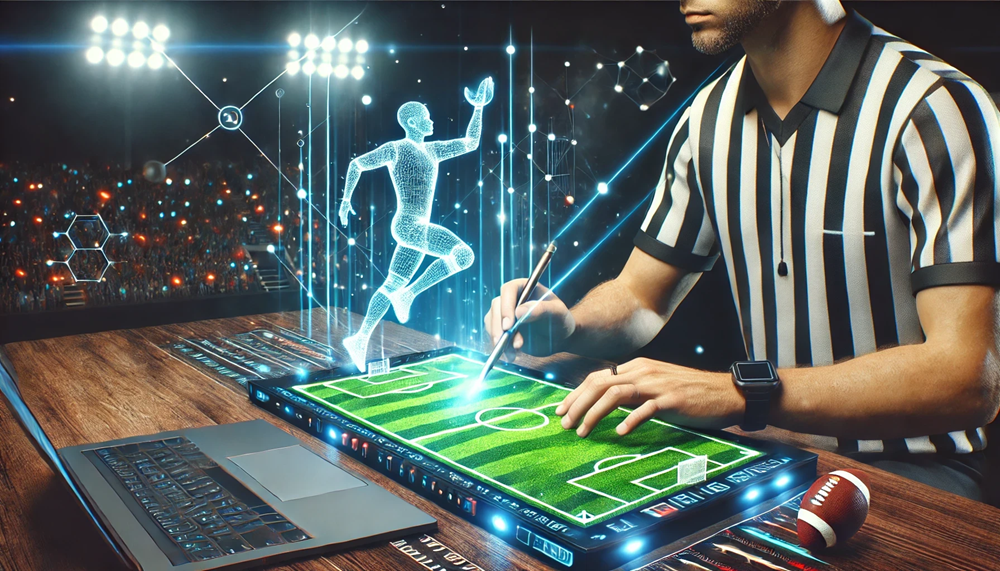In the fast-paced world of sports, where every second counts and decisions can alter the course of a game, ensuring fair play is paramount. Technology, particularly artificial intelligence (AI), is stepping up to meet this challenge. AI-powered officiating is revolutionizing how games are played, analyzed, and judged, providing accuracy, consistency, and transparency like never before.
What Is AI Powered Officiating?
AI-powered officiating refers to the integration of artificial intelligence systems in sports to assist or replace human referees. These systems use machine learning algorithms, computer vision, and real-time data processing to make or validate decisions during a game.
Key Technologies Behind AI Officiating
- Computer Vision: Analyzes live video feeds to detect rule violations and assess gameplay.
- Machine Learning: Continuously improves decision-making accuracy by learning from historical data.
- IoT Sensors: Tracks player movements, ball positions, and other in-game metrics with precision.
By leveraging these technologies, AI ensures that decisions are not only quick but also fair and unbiased.
Benefits of AI in Sports Officiating
The adoption of AI in officiating brings several benefits that enhance the integrity of sports.
Unmatched Accuracy
AI systems can analyze multiple angles simultaneously and identify rule infringements that might be missed by the human eye. For instance, Hawk-Eye technology in tennis ensures precise line calls, reducing the margin of error significantly.
Consistency in Decision-Making
Human referees can be influenced by emotions, fatigue, or external pressures. AI eliminates these variables, ensuring consistent decisions throughout the game.
Faster Decisions
AI-powered tools process data in real-time, enabling instant decisions. This speed reduces game delays caused by lengthy referee deliberations.
Enhanced Transparency
With AI, every decision is backed by data and video evidence, making it easier for players, coaches, and fans to understand and accept rulings.
Applications of AI Officiating Across Sports
AI is transforming officiating across various sports, each with unique applications tailored to the game’s needs.
Football (Soccer)
- VAR (Video Assistant Referee): Uses AI to assist referees in making critical decisions such as offside calls and penalty reviews.
- Goal-Line Technology: Ensures the ball has crossed the goal line with millimeter precision.
Tennis
- Hawk-Eye Live: Fully automates line calls, eliminating the need for line judges and ensuring consistent rulings.
Basketball
- AI Shot Detection: Tracks the ball’s trajectory to determine if a shot was made within the time limit.
- Player Monitoring: Sensors track player movements to detect fouls or violations like traveling.
Cricket
- DRS (Decision Review System): Combines ball-tracking and edge-detection technologies to assist umpires in LBW and edge decisions.
Challenges and Criticisms of AI-Powered Officiating
While AI brings many benefits, it is not without challenges.
High Implementation Costs
The installation and maintenance of AI systems require significant investment, limiting their adoption to high-budget leagues and tournaments.
Limited Human Intuition
AI relies on predefined rules and data, which may not account for the nuances or spirit of the game that human referees can interpret.
Resistance to Change
Traditionalists argue that technology disrupts the flow of the game and takes away its human element, creating debate about its widespread adoption.
The Future of AI in Sports Officiating
The future of AI-powered officiating is bright, with continuous advancements enhancing its capabilities. Innovations like predictive AI may soon help anticipate player behaviors and potential rule violations before they occur. Additionally, as costs decrease, AI technology will become accessible to amateur and grassroots sports, leveling the playing field globally.
AI-powered officiating is transforming sports by ensuring fair play, accuracy, and consistency. While challenges remain, the benefits of integrating AI into officiating systems far outweigh the drawbacks. As technology evolves, it promises to make sports more equitable and enjoyable for players and fans alike.
